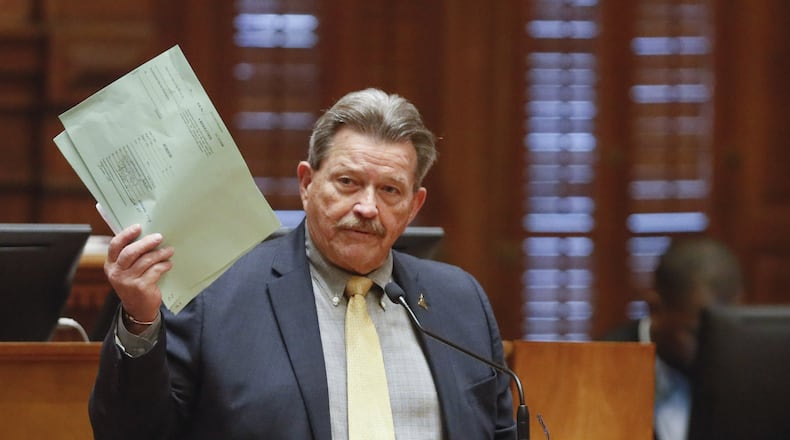Of all the ideas to change Georgia election laws, legislators are moving forward with a bill that focuses on ballot bookkeeping.
The House Governmental Affairs Committee voted Wednesday to pass a proposal that would require consistent use of forms, signatures and seals as ballots move through the election process.
The legislation deals with the bureaucratic back end of elections rather than taking on more controversial topics such as voter eligibility challenges, election takeovers or whether to eliminate runoffs.
The bill’s supporters say it will increase confidence among conservative election skeptics who doubt that absentee ballots were kept secure during the 2020 presidential election.
Over two years later, there’s no evidence of tampering with Georgia’s election results, though government records indicate that election workers didn’t always fill out paperwork correctly when they handled ballots.
“It will create a certain level of trust and confidence in the system. As we saw in the elections just last year, I heard very little problems,” said state Rep. Alan Powell, a Republican from Hartwell who sponsored the bill. “Every little part that could give credence to our elections is what’s needed right now.”
The committee passed the measure, House Bill 17, along a party-line vote, with Democrats in opposition saying it would create more work and costs for county election officials with little benefit.
A similar bill considered last year didn’t pass after election officials called it “security theater.”
“We’re trying to fix something that doesn’t need a fix,” said state Rep. Shea Roberts, a Democrat from Atlanta.
Credit: Alyssa Pointer / Alyssa.Pointer@ajc.com
Credit: Alyssa Pointer / Alyssa.Pointer@ajc.com
While other election-related initiatives haven’t received hearings or votes, lawmakers could still bring up new proposals or add them to other bills anytime before this year’s legislative session’s conclusion at the end of March.
In recent years, the General Assembly has made major changes to voting laws after election years. Legislators required a new statewide voting system in 2019 and passed a far-reaching elections bill in 2021.
One month into this year’s legislative session, no lawmaker has introduced a bill that would eliminate runoffs.
The ballot chain-of-custody bill that cleared its committee Wednesday requires ballot transfer forms, sign-in sheets when workers take possession of ballots, and seals on ballot containers to prevent tampering. Many local elections offices already follow similar practices.
“We are still legislating the 2020 election,” said Cindy Battles of the Georgia Coalition for the People’s Agenda, a civil rights organization. “This is not going to fix conspiracy theories. I wish it did.”
Election critics have accused Fulton County of failing to complete ballot transfer forms for drop boxes, though the county’s accounting showed only six missing forms out of roughly 1,200 during the 2020 presidential election. Several other counties, including Coffee, Grady and Taylor, also allegedly didn’t complete the forms.
Three statewide vote counts showed that Democrat Joe Biden defeated Republican Donald Trump by about 12,000 votes. There’s no indication of fraudulent results following investigations by the secretary of state’s office and the GBI.
“Any legislation that solidifies the trust in the citizen ... for free and fair elections is extremely important,” Paulding County Republican Party Chairman Jim Tully told legislators. “It takes nothing to reach down with a pencil and say, ‘I checked this one out.’ ”
The bill also includes a provision to ensure that absentee ballots are quickly mailed to voters.
County election offices would have to put ballots in the mail within three days after accepting a voter’s ballot application, according to the amendment proposed by state Rep. Saira Draper, a Democrat from Atlanta. During last year’s elections, officials sometimes told voters their ballots had been “issued” before they were actually sent.
The bill could receive a vote in the full Georgia House of Representatives in the coming days.
About the Author
Keep Reading
The Latest
Featured




